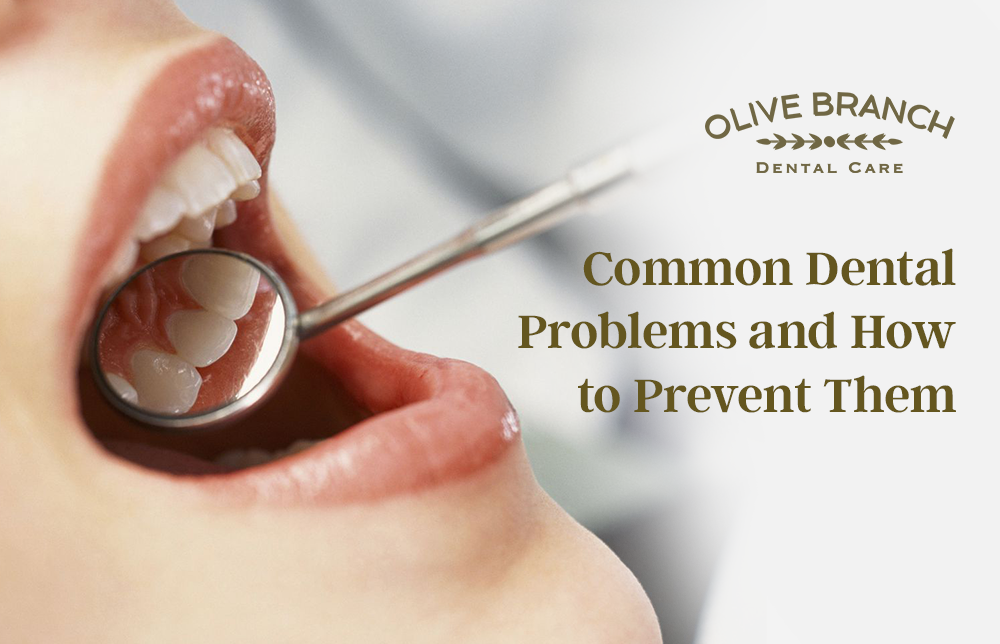Dental health is crucial for overall well-being, yet many people overlook it until they encounter problems. At Olive Branch Dental Care, we emphasize the importance of regular dental check-ups and proper oral hygiene to prevent common dental issues. In this blog, we will explore some of the most common dental problems and provide tips on how to prevent them.
Tooth Decay
What is it? Tooth decay, or cavities, is one of the most prevalent dental problems. It occurs when plaque, a sticky film of bacteria, forms on teeth and produces acids that erode enamel.
Prevention Tips:
- Brush and Floss Regularly: Brush at least twice a day and floss daily to remove plaque and food particles.
- Use Fluoride Toothpaste: Fluoride helps strengthen tooth enamel and makes it more resistant to decay.
- Limit Sugary Foods and Drinks: Bacteria in the mouth feed on sugar, producing acids that cause decay.
- Regular Dental Check-ups: Visit your dentist every six months for cleanings and check-ups to catch early signs of decay.
Gum Disease
What is it? Gum disease, or periodontal disease, starts as gingivitis, an inflammation of the gums. If untreated, it can progress to periodontitis, which can damage the soft tissue and bone supporting the teeth.
Prevention Tips:
- Maintain Good Oral Hygiene: Brush and floss regularly to remove plaque that can cause gum disease.
- Quit Smoking: Smoking is a major risk factor for gum disease.
- Regular Dental Visits: Professional cleanings can remove tartar and help prevent gum disease.
- Healthy Diet: A diet rich in vitamins and minerals supports gum health.
Tooth Sensitivity
What is it? Tooth sensitivity is a common issue where teeth experience pain or discomfort when exposed to hot, cold, sweet, or acidic foods and drinks.
Prevention Tips:
- Use Desensitizing Toothpaste: These toothpastes can help block the transmission of pain signals from the tooth surface to the nerve.
- Avoid Acidic Foods and Drinks: Limit consumption of acidic foods and beverages that can erode enamel.
- Gentle Brushing: Use a soft-bristled toothbrush and avoid brushing too hard.
- Regular Dental Visits: Your dentist can identify the cause of sensitivity and recommend appropriate treatments.
Bad Breath (Halitosis)
What is it? Bad breath, or halitosis, can be caused by various factors, including poor oral hygiene, gum disease, dry mouth, and certain foods.
Prevention Tips:
- Brush and Floss Regularly: Clean your teeth and tongue to remove food particles and bacteria.
- Stay Hydrated: Drink plenty of water to keep your mouth moist and wash away food particles.
- Avoid Tobacco Products: Smoking and tobacco use can cause bad breath.
- Regular Dental Check-ups: Regular cleanings can help prevent gum disease and other conditions that cause bad breath.
Tooth Erosion
What is it? Tooth erosion occurs when acids wear away the enamel, leading to sensitivity, discoloration, and other dental issues.
Prevention Tips:
- Limit Acidic Foods and Drinks: Reduce consumption of soda, citrus fruits, and other acidic items.
- Rinse After Eating: Rinse your mouth with water after consuming acidic foods or drinks.
- Chew Sugar-Free Gum: This stimulates saliva production, which helps neutralize acids.
- Use a Straw: When drinking acidic beverages, use a straw to minimize contact with teeth.
Tooth Grinding (Bruxism)
What is it? Tooth grinding, or bruxism, is often related to stress and can occur during sleep. It can lead to tooth damage, jaw pain, and headaches.
Prevention Tips:
- Stress Management: Practice stress-reducing techniques like meditation, exercise, or therapy.
- Use a Mouthguard: Your dentist can provide a custom mouthguard to protect your teeth during sleep.
- Regular Dental Visits: Your dentist can monitor your condition and recommend appropriate treatments.
Oral Cancer
What is it? Oral cancer can affect any part of the mouth or throat and is often linked to tobacco use, alcohol consumption, and human papillomavirus (HPV).
Prevention Tips:
- Avoid Tobacco and Limit Alcohol: Reducing these risk factors can significantly lower your risk.
- Regular Self-Exams: Look for unusual sores, lumps, or changes in your mouth and report them to your dentist.
- Regular Dental Check-ups: Your dentist can perform screenings for oral cancer during routine visits.
- HPV Vaccination: Consider vaccination to protect against HPV-related oral cancers.
Conclusion
Maintaining good oral health is essential for preventing common dental problems. By following these prevention tips and scheduling regular visits to Olive Branch Dental Care, you can keep your smile healthy and bright. Remember, early detection and treatment of dental issues can save you time, money, and discomfort in the long run. Contact us today to schedule your next appointment and take the first step towards optimal dental health.


Recent Comments